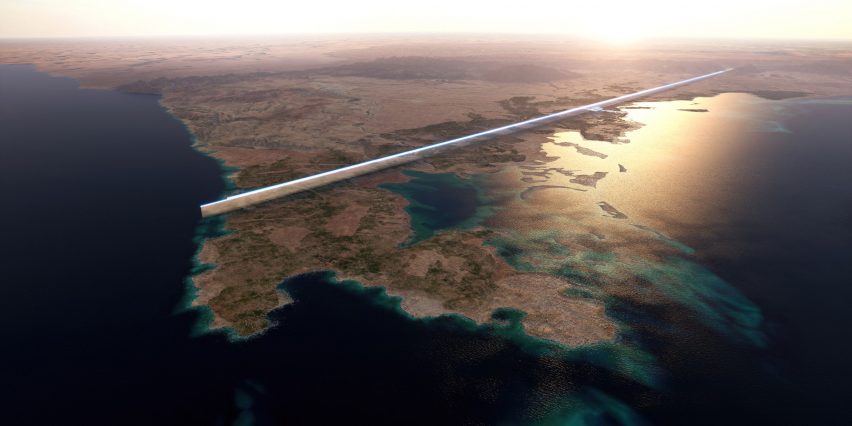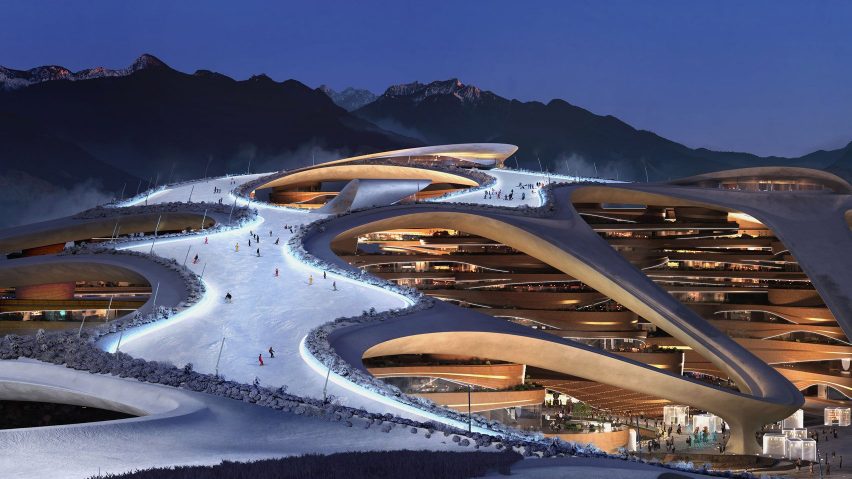
Architecture studios "benefiting" from alleged human rights violations at Neom
The architecture studios designing Neom in Saudi Arabia are facing a "moral dilemma" and should "think twice" about their continuing involvement in the project, says Amnesty International's Peter Frankental in this exclusive interview.
Speaking to Dezeen, economic affairs programme director at Amnesty International UK Frankental said that the studios designing Neom "must be aware" of reported human rights violations relating to the project and that it was "regrettable" that they haven't commented.
Neom being built "on the back of forced evictions"
Last month it was reported that three men forcibly evicted from the Neom site had been sentenced to death.
The controversial project is being designed by architecture studios including US-based Morphosis and Aedas, British studio Zaha Hadid Architects, Dutch studio UNStudio, German studio LAVA and Australian studio Bureau Proberts.
Frankental argued that while the Saudi government is ultimately responsible for the reported forced evictions, the architecture studios involved will financially benefit from them.

"It's the Saudi government who are responsible for these violations, but [the architecture studios] will be benefiting from them," he said.
"If they receive contracts for designing architecture for Neom, it's on the back of forced evictions and on the back of the threats and punishment that have been given out to people who resisted eviction."
According to Frankental, working on Neom poses a moral dilemma for architecture studios and could also impact their reputations.
"Companies do have a responsibility to be well aware of what they're entering into and the human rights violations that they will be linked to through their business relationship, and the impact of that," he said.
"These are factors that put the companies designing Neom very close to those human rights violations that are occurring. And they do need to think twice, about whether they want to invest under those circumstances."
Architecture studios "bear some responsibility" for calling out violations
Frankental believes that the architecture studios designing Neom have a responsibility to hold the Saudi government to account for its actions. He also suggested they consider withdrawing from the project.
"It's regrettable that they haven't [commented]," he said. "Obviously, these companies must be aware of the forced evictions that have taken place."

"[Companies] do bear some responsibility for taking steps to at least call out these violations, and perhaps to decide that actually, they don't want to be seen to be benefiting," he continued.
"It's up to anyone who believes in human rights to be able to stand up to that and to make sure that the Saudi government does pay a price."
The controversial Neom project includes a 170-kilometre-long mega city called The Line being designed by US studio Morphosis along with a ski resort being designed by Zaha Hadid Architects, UNStudio, Aedas, LAVA and Bureau Proberts. Eight other regions are planned as part of the overall development.
The Line has been criticised on sustainability and liveability grounds with experts telling Dezeen that the project's claims were "naive". However, Neom's executive director for urban planning Tarek Qaddumi told Dezeen that the project will "revolutionise our current way of life".
Last month, human rights organisation ALQST reported that Shadli al-Huwaiti, Ibrahim al-Huwaiti and Ataullah al-Huwaiti, who had reportedly criticised The Line, had been sentenced to death by Saudi Arabia's Specialised Criminal Court.
Read the interview with Frankental below:
Tom Ravenscroft: There have been reports of human rights violations on the Neom site in Saudi Arabia, which is being designed by some of the world's leading architects. Do you think that these studios should be calling out these violations or making statements?
Peter Frankental: It's regrettable that they haven't [commented]. Obviously, these companies must be aware of the forced evictions that have taken place. And that there's been resistance from tribal groups to their evictions. And that resistance has been clamped down on very heavily and some of those who are under threat of the death penalty.
These are factors that put the companies designing Neon very close to those human rights violations that are occurring. And they do need to think twice, about whether they want to invest under those circumstances.
It's not a question of whether they'd be complicit in the violations because obviously, it's the Saudi government who are responsible for these violations, but they will be benefiting from them. If they receive contracts for designing architecture for Neom, it's on the back of forced evictions. And on the back of the threats and punishment that have been given out to people who resisted eviction.
Companies need to be aware of that and they do bear some responsibility for taking steps to at least call out these violations, and perhaps to decide that actually, they don't want to be seen to be benefiting.
Tom Ravenscroft: So they stand to benefit from the violation and the decision they have to make is whether the financial benefits outweigh the potential negative impression people have of their studios?
Peter Frankental: Yes, it's a moral dilemma that they're facing, it could be a reputational issue. And certainly, companies do have a responsibility to be well aware of what they're entering into and the human rights violations that they will be linked to through their business relationship, and the impact of that.
Tom Ravenscroft: It sounds like you're not advocating for entirely boycotting working in Saudi Arabia, more of making decisions on a project-by-project basis?
Peter Frankental: Yes, it's up to a company to decide on the basis of the information that they have and a proper human rights due diligence process, whether they feel that they can legitimately, but also morally, enter into those business activities. And what steps that they can take to mitigate the human rights consequences.
Clearly, the Saudi Arabian government is using their financial cloud to try to silence their critics, and they're assuming that they will be able to minimise the reputational impacts to them of the human rights violations that are occurring.
It's up to anyone who believes in human rights to be able to stand up to that and to make sure that the Saudi government does pay a price. So anything that companies can do to draw attention to the human rights violations, proper impact assessments, to ask questions of the Saudi government, to use the media – such as Dezeen, to draw attention to issues of concern to them to get together with other companies to do that, you know, that will counter this.
Tom Ravenscroft: So in your mind is there a clear differentiation between designing a train station in Riyadh or designing The Line at Neom?
Peter Frankental: Again, only a proper process of human rights due diligence and impact assessment can determine what the respective human rights implications are. Companies need to be aware of what they're letting themselves in for and make sure that they take all steps within their powers be able to minimise any human rights violations linked to their activities.
Clearly, at Neon, there's a much wider range of human rights issues come into play. Because it will be designed as a smart city, because of the levels of surveillance, because of issues of freedom of expression and privacy, that probably don't come into play to the same extent as, say, a railway station.
Tom Ravenscroft: So there is what is happening right now with the clearance of the site, which has been pretty widely reported on, but there's also the actual thing once it's built and the surveillance implications?
Peter Frankental: Yes. And also the large numbers of migrant workers that will be used to service Neom. We're talking about 10s of 1,000s, maybe hundreds of 1,000s of people – cleaners, security guards, domestic workers, all the other workers – the conditions under which they'll be living and working. What kind of redress with regard to the exorbitant recruitment agency charges that they may be subject to will they be? Well, they have their visas annulled and be deported at the drop of a hat if they complain about the working condition.
So there are all kinds of issues that really any firm investing in Neom needs to try to address with the Saudi government.